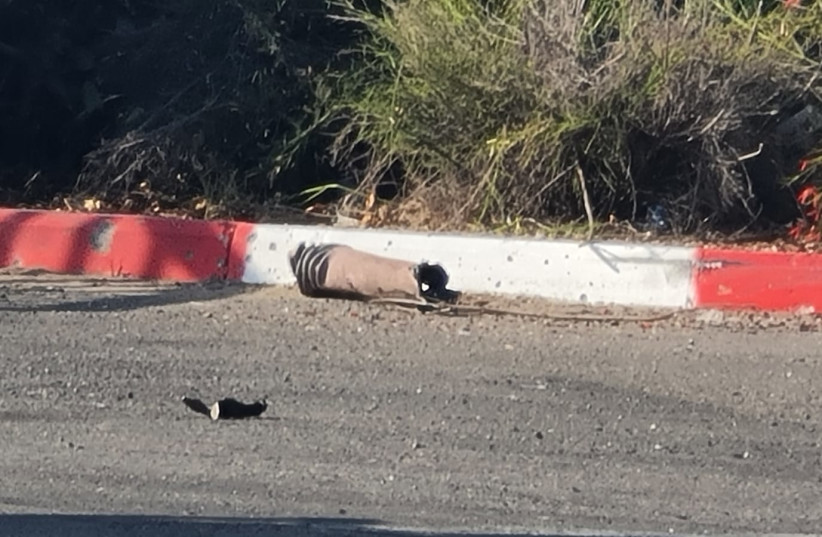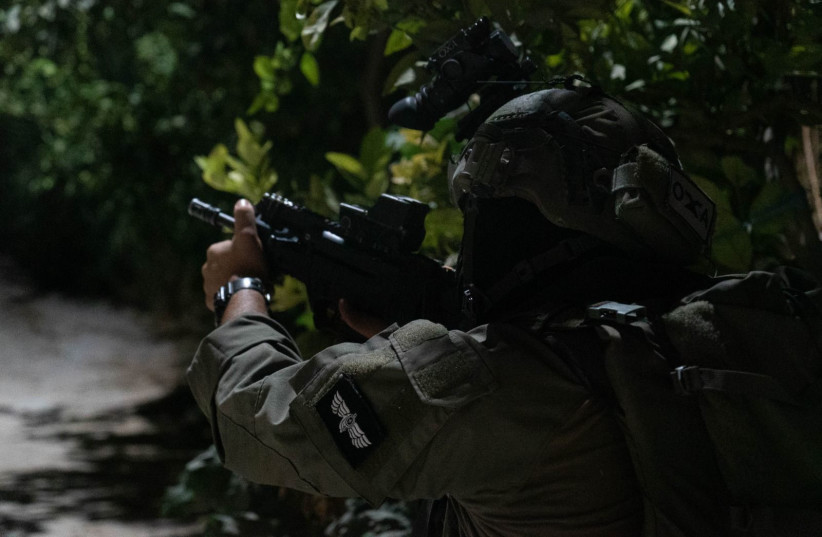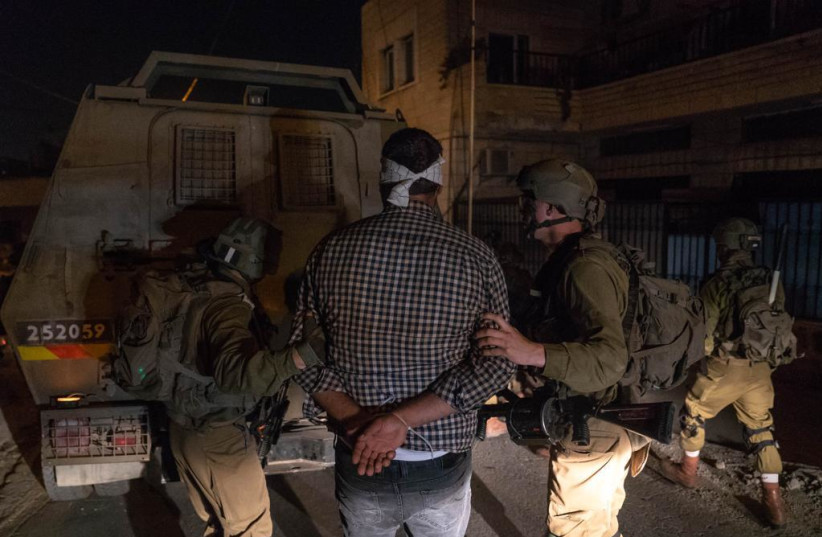After nearly 1,000 rockets were launched toward Israel by Palestinian Islamic Jihad since the beginning of Operation Breaking Dawn, the announcement of a ceasefire increased hopes for calm.
As of Sunday evening, 935 rockets were fired by the terrorist group. Approximately 160 fell short in Gaza and 775 crossed into Israeli territory. Some 300 rockets heading toward populated areas were intercepted by the Iron Dome missile-defense system for a 96% interception rate.
Just hours before the ceasefire was set to go into place, a large barrage was fired toward central and southern Israel, including Tel Aviv and Ben-Gurion Airport, sending thousands running for shelter. According to some reports, at least 50 rockets were fired.
Two rockets were intercepted over Tel Aviv and while photos out of the airport showed an interception, the airport’s spokesperson denied that there had been an interception, telling The Jerusalem Post that “the airport is running as normal.”
Intensive last wave of airstrikes carried out as ceasefire took effect
Shortly before the ceasefire took effect, multiple barrages of rockets were fired from the Gaza Strip towards Israeli communities near the border, as the IDF carried out a large wave of airstrikes against targets in the Strip planned ahead of time by the defense establishment for the end of the operation.
Shortly after the ceasefire took effect, two waves of rocket fire were launched towards Israeli communities near the Gaza border. No faction took responsibility for the fire.
'We will continue to act until we restore peace'
Prime Minister Yair Lapid, Defense Minister Benny Gantz and IDF Chief of Staff Lt.-Gen. Aviv Kohavi held a situational assessment in the IDF’s Southern Command and met with troops taking part in the operation. Later on Sunday the officials held another situational assessment in the Kirya in Tel Aviv with Mossad Director David Barnea, Shin Bet (Israel Security Agency) Director Ronen Bar and Defense Ministry Director-General Amir Eshel.
“We will continue to act until we restore peace and remove threats facing the citizens of Israel,” Gantz said during the visit to the South. “We will not allow any group to threaten or harm the citizens of Israel. Whoever tries to will be hurt.”
Early in the morning, after an overnight lull of about five hours, rocket sirens blared in two southern Israel communities close to the Gaza border.
Warning sirens later sounded in the Jerusalem area, including in the communities of Neve Ilan, Har Adar and the Arab-Israeli town of Abu Gosh. Sirens also sounded simultaneously in Gaza border communities.

Later in the day, incoming rocket sirens also sounded in Beersheba and neighboring communities for the first time in the conflict. Sirens then blared in Rishon Lezion, Yavne, Ness Ziona, Ashdod, Ashkelon and smaller communities across the area.
Heavy barrages toward southern Israel were launched throughout the late afternoon and early evening.
The Eshkol Regional Council on Sunday said a missile hit a home in the area but that there were no injuries as the family was in their bomb shelter, although the structure itself sustained some damage. Additionally, a fragment of a missile fell in an open area in Sderot, the municipality announced, adding that no injuries were reported.

The Erez border crossing was hit by three mortar bombs fired by Islamic Jihad on Sunday afternoon, causing a fire and damaging the terminal roof, causing shrapnel to fall inside the entrance hall.
The “area is used to facilitate the daily passage of thousands of Gazans that work in Israel,” the Defense Ministry said.
Since the beginning of the operation, the IDF has targeted 140 Islamic Jihad figures, including senior and anti-tank missile operatives. The military also destroyed 11 rocket launch sites, six military sites and eight terror cells that were on their way to or coming back from launching rockets.
Israel Air Force jets also destroyed an attack tunnel belonging to Islamic Jihad in the southern and central parts of the Strip. While it didn’t cross into Israel, it came close to the border.
Magen David Adom emergency services said that since the beginning of the operation, it has taken 28 people to hospital for injuries. The majority were in light condition or were treated for anxiety and released shortly after.
According to the Palestinian Health Ministry in Gaza, 32 people including six children and four women have been killed in the coastal enclave, the majority of them Islamic Jihad operatives. Another 284 were wounded.
The IDF confirmed that 4,000 reservists were called up on Sunday, out of a cap of 25,000 troops that was approved by Defense Minister Benny Gantz on Friday. Gantz, in coordination with Prime Minister Yair Lapid, approved the mobilization of the reservists under the “Tzav 8” emergency call-up order.

The army said it would replace the emergency call-up orders that were issued at the beginning of the operation and would make it easier for female and reservist soldiers to exercise their rights in the workplace and in academic studies.
“The security system and the State of Israel are committed to providing full rights to the reservists, who are an integral and essential part of the effort,” Gantz said.
The orders are valid for seven days, at the end of which Gantz can apply to obtain the government’s approval to extend the call-up.
Who were the IDF's targets?
IDF Spokesperson Brig.-Gen. Ran Kohav confirmed on Sunday morning that senior Islamic Jihad operative Khaled Mansour was killed in an Israeli airstrike along with two other senior operatives who were with him in his home. The Israeli military identified the two as the commander of the terrorist group’s Rafah Brigade, Khattab Amassi, and Mansour’s deputy, Ziad Madalal.
The IDF on Sunday night released footage ahead of the strike on Mansour, showing three children in the area of his home. Pilots are heard saying, “I see children running in the trees…call off the attack.”
According to the military, the strike was postponed several times until there were no children or other civilians in the area.
Mansour was equivalent to a general, Kohav said, adding that the strike against him was approved and coordinated by IDF Chief of Staff Lt.-Gen. Aviv Kohavi, Prime Minister Yair Lapid and Defense Minister Benny Gantz.
Mansour, who was the group’s equivalent to Tayseer al-Jabari in the southern part of the Gaza Strip, was behind numerous missile and anti-tank-guided missile attacks against Israel.
During Operation Guardian of the Walls last May, Mansour commanded the launching of heavy rockets toward the Israeli cities of Ashdod and Ashkelon and worked to implement offensive plans against IDF forces and Israeli citizens.
According to the army, he took responsibility for the attack in which Maj. Eliraz Peretz and St.-Sgt. Ilan Sviatkovsky were killed in 2010.
Tisha Be'av Jerusalem tensions
Islamic Jihad addressed the killings Sunday morning, stating that “The Zionist aggression in the city of Rafah killed him, as well as the holy warriors Ziad al-Mudlal, Rafat Saleh, and four residents of our people – including a boy and two women whose bodies were found under the rubble.”
The organization threatened that “Khaled Mansour’s blood will ignite the defense system for Jerusalem and al-Aqsa Mosque, which the settlers will break into today.”
Hamas announced that one of its members, 33-year-old Ahmed Afana, was killed in an Israeli strike in the Jabalya refugee camp.
“He dedicated himself to God, striving until he met God for it,” according to the group’s military wing, Al-Qassam Brigades.
What about the attack in Jabalya?
On Sunday evening, an explosion in Jabalya refugee camp killed at least five people in northern Gaza, though it was unclear if it was due to a failed rocket launch or an IAF strike.
An explosion there on Saturday night killed at least nine people, including at least four children. It was initially blamed on an Israeli airstrike, but the military denied that it played any part in it, saying that the blast was caused by a failed rocket launch by Islamic Jihad and that it had radar showing the launch of the rocket from a site close to the mosque where the incident occurred.
“We have more and more information coming in confirming that it was a failed launch,” not an IDF strike, said Kohav. “The Palestinians understand that it wasn’t Israel’s doing. We have nothing to hide.”
An IDF airstrike on an Islamic Jihad weapons storage facility in Gaza was aborted due to the presence of a civilian, the IDF spokesperson said on Sunday.
Video of the event published by the IDF shows a pedestrian walking near the residence of an Islamic Jihad operative that also housed the weapons stockpile.
“We are aborting immediately,” said the IDF soldiers monitoring the strike. “Abort immediately. Abort.”
The strike was reportedly carried out at a later time when the area was clear of civilians.
Israeli security forces also arrested 20 Islamic Jihad operatives overnight in the West Bank as part of Operation Break the Wave.
The arrests were made in Jenin, Seida near Tulkarm, Anza, Ra’i and in Tulkarm’s refugee camp, where six of the arrests took place. Suspects were also arrested in El-Khader and Beit Fajar near Bethlehem, and in Nablus where clashes broke out with Palestinians throwing stones and opening fire on IDF troops.
"Khaled Mansour's blood will ignite the defense system for Jerusalem and Al-Aqsa Mosque, which the settlers will break into today."
Palestinian Islamic Jihad
